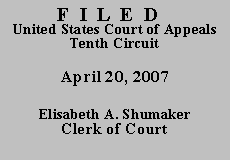

| JEANNE HUBER-HAPPY; J. H., a minor child, |
|
| v. | |
| ESTATE OF PAULINE RANKIN, |
Plaintiffs appealed both the remand order and the award of attorney fees. On December 28, 2006, we dismissed Plaintiffs' appeal of the remand order but did not address the district court's award of fees. We directed Plaintiffs to "file [an] opening brief addressing the attorney fees issue only" within 40 days. Huber-Happy v. Estate of Rankin, No. 06-3356, slip op. at 2 (10th Cir. Dec. 28, 2006).
"Under 28 U.S.C. § 1441 a defendant in state court may remove [an action] to federal court when a federal court would have had jurisdiction if the case had been filed there originally." Topeka Hous. Auth. v. Johnson, 404 F.3d 1245, 1247 (10th Cir. 2005). If the federal district court lacks jurisdiction over the removed case, it must remand it to the state court. See 28 U.S.C. § 1447(c). In doing so, the district court "may require payment of just costs and any actual expenses, including attorney fees, incurred as a result of the removal." Id. The Supreme Court recently explained that although district courts have discretion in ordering payment of fees and costs, "the standard for awarding fees should turn on the reasonableness of the removal. Absent unusual circumstances, courts may award attorney's fees under § 1447(c) only where the removing party lacked an objectively reasonable basis for seeking removal." Martin v. Franklin Capital Corp., 126 S. Ct. 704, 711 (2005).
Plaintiffs' removal of the state-court probate proceeding in this case was objectively unreasonable. Ms. Huber-Happy, though proceeding pro se, is allegedly an attorney, J.H., 2006 WL 2644962, at *3, and it is a well-established principle that federal courts will not assume general jurisdiction over state-court probate matters, see Rienhardt, 164 F.3d at 12991300. In their brief filed in response to our December 28, 2006, order, Plaintiffs made no challenge to the applicability of this principle or to the award of fees. Indeed, to the extent we understand their brief, it made no argument whatsoever. We are also aware of no cases casting doubt on the district court's determination that the removal was objectively unreasonable. Accordingly, the district court did not abuse its discretion in ordering payment of attorney fees and costs. See Topeka Hous. Auth., 404 F.3d at 1248 (district court's award of fees is reviewed for abuse of discretion but its underlying legal analysis is reviewed de novo).
The district court's decision awarding attorney fees and costs to the Estate is AFFIRMED. We DENY Plaintiffs' "Motion for Leave to Proceed on Appeal Without Prepayment of Costs or Fees." We DENY Plaintiffs' November 20, 2006, objection to various court orders and motion for payment of costs for transcripts and records. Because all pending motions have now been addressed, Plaintiffs' December 15, 2006, "Motion for Response to All Pending Motions" is moot.
ENTERED FOR THE COURT
Harris L Hartz
Circuit Judge
*.This order and judgment is not binding precedent except under the doctrines of law of the case, res judicata, and collateral estoppel. It may be cited, however, for its persuasive value consistent with Fed. R. App. P. 32.1 and 10th Cir. R. 32.1.